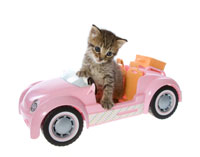Boarding Options for Cats
 So you need to be away from home. Can the cat come along? If so, see our article on Traveling with Cats for valuable travel tips. If your kitty must stay behind, what are your options?
So you need to be away from home. Can the cat come along? If so, see our article on Traveling with Cats for valuable travel tips. If your kitty must stay behind, what are your options?
Boarding your cat away from the home can be done a few different ways—boarding at the local veterinary hospital or at a pet boarding facility are two options. Home boarding care can be done by hiring a pet sitter, or perhaps a friend or family member will come in to care for the cat.
Cat Boarding Facilities
Boarding your cat at a specific facility can be an excellent option.
Veterinary Clinics
Veterinary hospitals frequently offer boarding facilities in a section of the hospital well separated from the sick patients. Professional care of the pet by well-trained staff and access to immediate veterinary care if needed are two advantages of this arrangement. Cats that require regular home care such as diabetic cats that need injections, or kidney failure cats that are receiving regular medication and fluids are probably best placed in this type of high care boarding environment. Even for a healthy pet, you can be assured that the staff knows all about your pet’s needs.
Cat Kennels
A professional boarding facility is another option, and some provide very high-quality facilities with lots of space, enrichment, and, sometimes even spa features. Avoid places that mix cats together freely. This will increase the risk of your cat contracting illness and suffering fight injuries. Visit the facility to assess cleanliness and quality of construction, check references, and meet the caregivers to assess their attitudes, knowledge, and qualifications. Discuss the availability of custom care. Some facilities will spend a set time each day with the boarding cats to play with them individually. This is an excellent feature. Cats should be fully vaccinated before entering any boarding facility, and some facilities require proof of virus-negative status, so check ahead and make sure your cat is up-to-date on the required boosters and tests.
Cats are much happier away from the sounds, smells, and sight of dogs! Unless they are seeing their best home doggie buddy, other dogs should be as far away as possible because this produces stress in boarded cats.
Considerations for Boarding Your Cat
Ensure that the diet fed is the one you normally feed your cat and that it will be given at the usual times. If they do not stock your food at the facility, take your own container with you. Familiar toys will be allowed by most facilities. Blankets and beds may not be allowed due to the risk of introduction of flea and parasite eggs and larvae, so ask ahead about this matter if you wish to provide these for your cat during boarding.
Leave a number where you can be reached, as well as that of a trusted friend or neighbor as a back up. Give written authorization for medical care and define the extent of dollar expenditure if you would like control over maximum emergency fees before you are contacted. Supply contact information for your veterinarian/emergency clinic of choice. Make sure your veterinarian knows about this because they may require a signed authorization placed with the medical record at the veterinary practice before you leave. Make sure a billing arrangement has been made if you do not leave a contingency fund. Provide the boarding facility with your home medical record (or a copy) describing any unusual problems your cat may have and a history of vaccinations, testing, and de-worming. The more you put in writing, the less guesswork is done if you cannot be reached.
Home Boarding for Your Cat
Pet sitters will visit your home a few times daily to feed and play with your cat. This is an excellent option! Your cat gets to stay in a familiar environment and gets individual attention. Check for credentials, bonding and insurance, and check references. Sometimes veterinary technicians will offer pet sitting to clients of their veterinary hospital or as an independent business. A certified vet tech makes an excellent sitter because they have taken stringent veterinary medical training and know how to handle veterinary issues if they should arise. They can also capably do first aid and intensive home veterinary care of diabetics and other chronic care cats.
Having friends or family members come into your home and do the cat home boarding care is also a great option, especially if your cat knows them. Sometimes, they might offer to take the cat to their home, and this also works well if they are able to accommodate the feline guest.
In summary, when it comes to boarding, what is right for one cat is not always right for another, so if you are not sure which works best, try out a few different boarding arrangements and see what you and your feline companion prefer.
You May Also Like These Articles:
Training Your Cat To Use A Pet Carrier




